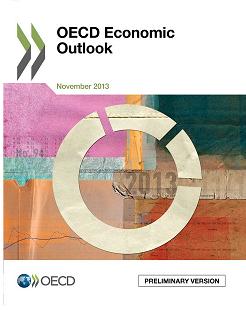OECD, (2013), OECD Economic Outlook, Vol. 2013/2, OECD Publishing. Τhe global economy is expected to continue expanding at a moderate pace over the coming two years, but policymakers must ensure that instability in financial markets and underlying fragility in some major economies are not allowed to derail growth, according to the OECD’s latest Economic Outlook. “The recovery is real, but at a slow speed, and there may be turbulence on …Read More
Central Banks and Financial Stability
Wren-Lewis, S., (2013), “Central Banks and Financial Stability”, Social Europe Journal, 18 November. Inflation is significantly below 2% almost everywhere. In the US, Japan and the UK (even though in the UK inflation is still just above 2%) central banks are doing a great deal to get inflation back to 2%. Maybe not enough, but their goal is clear. The ECB is belatedly following the same path (although it remains …Read More
The Role of Financial Stress in the Sovereign Debt-Output Nexus, and in Economic Activity
Schoder, C., Proano, C. and Semmler, W., (2013), “The Role of Financial Stress in the Sovereign Debt-Output Nexus, and in Economic Activity”, EconoMonitor, 18 November. Since the outbreak of the euro area crisis, the link between a country’s macroeconomic performance and the level of its sovereign debt has become a central topic in the economic debate. Now, the recent showdown in the U.S. Congress over raising the country’s debt ceiling …Read More
The Next Europe: Toward a Federal Union
Berggruen, N. and Gardels, N., (2013), “The Next Europe:Toward a Federal Union”, Foreign Affairs, July/August Issue. When the heads of the EU’s three major institutions — the European Commission, the European Council, and the European Parliament — collected the Nobel Peace Prize together in Oslo last December, they spotlighted the vague mandate and lack of institutional clarity that are at the core of the organization’s current problems. Unless these institutions …Read More
The Jobs Recovery Is Always Two Years Away
Lizoain, D., (2013), “The Jobs Recovery Is Always Two Years Away”, Social Europe Journal, 18 November. Is the jobs recovery around the corner? A few week ago, the European Commission published its latest economic forecast. Unemployment in the Euro area is projected to drop from 12.2% in 2014 to 11.8% in 2015. This is seemingly good news. The bad news is that the Commission also predicted that unemployment would begin …Read More
Public debt and economic growth: There is no ‘tipping point’
Eberhardt, M. and Presbitero, A., (2013), “Public debt and economic growth: There is no ‘tipping point’”, VoxEU, 17 November. The idea that there is a common tipping point in the relationship between public debt and economic growth is still widespread. However, this is likely due to a misinterpretation of the existing evidence. Once we allow for the relationship between debt and growth to be country-specific, there is limited evidence supporting …Read More
Trade unions in Europe: Dinosaurs on the verge of extinction?
Schnabel, C., (2013), “Trade unions in Europe: Dinosaurs on the verge of extinction?”, VoxEU, 18 November. Though trade union density and its trends vary considerably across Western European countries, in most of them the current density has fallen down in comparison to 30 years ago. This column reviews some explanations for the decline of unionisation and discusses some of the challenges unions need to face. Union membership could still be …Read More
QE and ultra-low interest rates: Distributional effects and risks
Dobbs, R., Lund, S., Koller, T. and Shwayder, A., (2013), “QE and ultra-low interest rates: Distributional effects and risks”, McKinsey Global Institute, Discussion Paper, November. There is widespread consensus that the conventional and unconventional monetary policies that world’s major central banks implemented in response to the global financial crisis prevented a deeper recession and higher unemployment than there otherwise would have been. These measures, along with a lack of demand …Read More
The Money Trap
Krugman, P., (2013), “The Money Trap”, The New York Times, 14 November. When Greece hit the skids almost four years ago, some analysts (myself included) thought that we might be seeing the beginning of the end for the euro, Europe’s common currency. Others were more optimistic, believing that tough love — temporary aid tied to reform — would soon produce recovery. Both camps were wrong. What we actually got was …Read More
Governments must follow the ECB’s rate cut with policy action
Wolf, G., (2013), “Governments must follow the ECB’s rate cut with policy action”, Bruegel, 13 November. The Eurozone is still at risk of falling into deflation. Euro area core inflation rates, i.e. inflation rates excluding volatile energy and food prices, have been falling since late 2011. Inflation expectations two years ahead are hardly above one percent and even at a 5 year outlook, market-determined inflation forecast is at 1.44%. So …Read More





